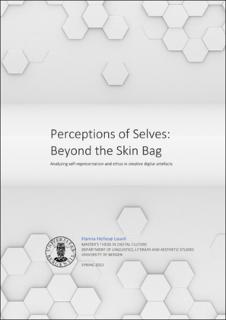| dc.description.abstract | As technological innovations reach new heights, questions regarding how we act, see, and live with machines reveal themselves. What was once viewed as mere tools have become something we perceive as part of our social world. Technological actants now hold the power of persuasion, the power to be perceived as a self. This constitutes new perspectives regarding how we relate to those with self-representational qualities. Relations between actants in social settings boil down to discourse, where this study manifests itself. The point of entry is, paradoxically, taking root in ancient theories of rhetoric. Because self-representation in digital artefacts must necessarily be produced, it becomes a text with the potential for analysis. In its broadest possible meaning, text is a modal manifestation of existence, a textual manifestation of self. The representations are always mediated, and that mediation opens up questions about authenticity, agency, and ethos. The artefacts I propose in this thesis exist in a way that changes shape in the perception of those who perceive it. When artefacts are imbued with some form of life, uniqueness, personality and ethos, approaches and attentions must change. That is dependent on the relations we allow and instil in them. We now have different relations than before, which means that the concept of ethos must be seen anew. This thesis is a philosophical and rhetorical exploration of how ethos and self-representation can be renewed to encompass more ways of being. Through perspectives inspired by Posthumanism and Actor-Network Theory, I explore themes relating to self-representation and ethos to conceptualize an updated framework that, in essence, “de-anthropocentrize” our field of view. This thesis does not aim to be either final or limiting, but a starting point in opening a conversation about the rhetorical impact we encounter every day through humans and otherwise. | |
